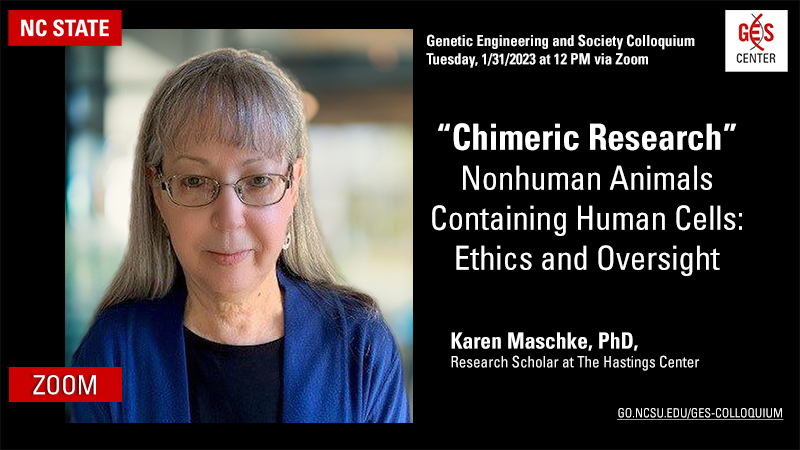
- This event has passed.
Karen Maschke – Nonhuman Animals Containing Human Cells: Ethics and Oversight | GES Colloquium, Spring 2023

Colloquium Home | Zoom Registration | GES Video Library (current) | Video Archives | Podcast | @GESCenterNCSU | Newsletter
Nonhuman Animals Containing Human Cells: Ethics and Oversight
Karen Maschke, PhD, Research Scholar at The Hastings Center
Website | Twitter @hastingscenter
This presentation focuses on ethical and oversight issues as they relate to the insertion of human cells into nonhuman animals, e.g., “chimeric research.”
Abstract
Research involving the insertion of human cells into nonhuman animals at various stage of development – referred to here as chimeric research – has helped scientists learn how human cells behave in a living environment. Advances in human stem cell science and gene editing are enabling scientists to more extensively and precisely insert human cells into nonhuman animals at any stage of development. Scientists have conducted in vitro experiments with chimeric embryos and in vivo studies that create chimeric animals. The goals of these studies include developing more accurate models of human diseases, creating inexpensive sources of human eggs and embryos for research, and developing sources of tissues and organs suitable for transplantation into humans. Yet concerns have been raised that by biologically altering nonhuman animals with human cells – particularly at an early stage of the chimeric animal’s development – scientists may end up changing them in morally relevant ways, especially if the chimeric animals exhibit “humanlike” behaviors or capacities that they previously lacked. An NIH-funded interdisciplinary research project of The Hastings Center and Case Western Reserve University examined the ethical, oversight, and policy issues regarding research that involves the transfer of human embryonic or induced pluripotent cells, or cells derived directly from them, into nonhuman animals or nonhuman animal embryos.
This presentation highlights three of the project’s recommendations:
- scientists, journalists, bioethicists and others writing about chimeric research should use precise and accessible language that clarifies rather than obscures the ethical issues at stake;
- animal welfare is a primary ethical issue and should be a focus of ethical and policy analysis as well as the governance of oversight of chimeric research; and
- enhanced communication between institutional committees involved in oversight of chimeric research is needed, as well as a mechanism for a national discussion amongst those in oversight of these studies.
Related links:
- Clarifying the Ethics and Oversight of Chimeric Research, Josephine Johnston, Insoo Hyun, Carolyn P. Neuhaus, Karen J. Maschke, et. al., 2022
- Composite Animals: Then and Now, Amy Hinterberger, 2022
- Human, Nonhuman, and Chimeric Research: Considering Old Issues with New Research, Jeff Sebo, Brendan Parent, 2022
- Threats to Benefits: Assessing Knowledge Production in Nonhuman Models of Human Neuropsychiatric Disorders, Carolyn P. Neuhaus, 2022
- Moral Status and the Oversight of Research Involving Chimeric Animals, Patricia Marshall, Kaitlynn P. Craig, Insoo Hyun, 2022
- A Conversation with Chimeric Animal Researchers, Kaitlynn P. Craig, 2022
- How Chimeric Animal Research Impacts Animal Welfare: A Conversation with Animal Welfare Experts, Kaitlynn P. Craig, 2022
Speaker Bio
Karen J. Maschke, PhD is a Research Scholar at The Hastings Center and the editor of the Center’s journal, Ethics & Human Research. As a researcher with training in political science and bioethics, she focuses on policy and ethical issues related to the introduction, use, regulation, and oversight of new biomedical technologies. She recently completed two projects: the NIH-funded project, “Actionable Ethics Oversight for Human-Animal Chimera Research” (co-Principal Investigator) and the NSF-funded project, “Public Deliberation on Gene Editing in the Wild” (co-Investigator). She is currently the lead co-Principal Investigator of the NIH-funded project, “Informing Ethical Translation of Xenotransplantation Clinical Trials.” She is interviewed frequently by the media, appearing in AP, New York Times, Wall Street Journal, NPR, Washington Post, Kaiser Health, STAT News, Reuters, and Bloomberg Law. Her recent book (co-authored with Michael K. Gusmano), is Debating Modern Medical Technologies: The Politics of Safety, Effectiveness, and Patient Access (Praeger, 2018).
GES Colloquium (GES 591-002) is jointly taught by Drs. Jen Baltzegar and Dawn Rodriguez-Ward, who you may contact with any class-specific questions. Colloquium will generally be live-streamed via Zoom, with monthly in-person meetings in the 1911 Building, Room 129. Please subscribe to the GES newsletter and Twitter for updates .
WordPress database error: [Unknown column 'wp_tec_occurrences.start_date' in 'SELECT']SELECT SQL_CALC_FOUND_ROWS wp_posts.*, CAST( wp_tec_occurrences.start_date AS DATETIME ) AS event_date
FROM wp_posts LEFT JOIN wp_term_relationships ON (wp_posts.ID = wp_term_relationships.object_id) LEFT JOIN wp_postmeta ON ( wp_posts.ID = wp_postmeta.post_id AND wp_postmeta.meta_key = '_EventHideFromUpcoming' ) LEFT JOIN wp_postmeta AS mt1 ON ( wp_posts.ID = mt1.post_id )
WHERE 1=1 AND wp_posts.ID NOT IN (18423) AND (
wp_term_relationships.term_taxonomy_id IN (87,149,521,604,921,922)
OR
wp_term_relationships.term_taxonomy_id IN (45,518,607,872,883)
) AND (
wp_postmeta.post_id IS NULL
AND
( mt1.meta_key = '_EventStartDate' AND CAST(mt1.meta_value AS DATETIME) >= '2026-03-02 16:15:08' )
) AND wp_posts.post_type IN ('post', 'page', 'attachment', 'tribe_venue', 'tribe_events', 'tribe_event_series') AND ((wp_posts.post_status = 'publish'))
GROUP BY wp_tec_occurrences.occurrence_id
ORDER BY event_date ASC, wp_posts.post_date ASC
LIMIT 0, 3